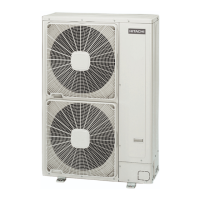9. Refrigerant and water piping
TCGB0075 rev.0 - 11/2012
105
9
9.2.3 Water quality
C A U T I O N
• WaterqualitymustbeaccordingtoEUcouncildirective98/83EC.
• Watershouldbesubjectedtoltrationortoasofteningtreatmentwithchemicalsbeforeapplicationastreated
water.
• It is also necessary to analyse the quality of water by checking pH, electrical conductivity, ammonia ion con-
tent, sulphur content, and others. Should the results of the analysis be not good, the use of industrial water
would be recommended.
• Itismandatorytodonotaddanykindofantifreezeproducttothewatercircuit.
• To avoid deposits of scale on the heat exchangers surface it is mandatory to ensure a high water quality with
low levels of CaCO
3
.
9.2.4 Water ow adjustment
In every installation the Circuit’s water ow must be adjusted according to its particular internal Water pressure lost. In
addition to this, the circuit should be set according to the Space heating (Heating Floor, Radiators, Fan Coils) and its co-
rresponding water outlet temperature. The procedure for adjusting the water ow is described below:
1 Pressure lost calculation
2 Check the Pump Performance Curves
3 Selection of the Pump Speed
4 Water ow adjustment
Procedure:
1 Pressure lost calculation
The indoor unit is factory supplied with two Water Pressure Ports placed in the Upper front support. The object of these
Water Pressure Ports, is to offer the installer a quick connection to read the Lost Pressure in the circuit when commissio-
ning.
Water Pressure ports
Upper front support
Plug in a differential Manometer to the Pressure Ports and open the inlet / outlet ports
(1*)
.
The Pressure Lost is calculated from the pressure difference between the value of the inlet and the outlet water pressure.
N O T E
(1*)
If there is no having a Differential Manometer, it is possible to do this operation with just one std. Manometer
(it is advisable to use the same Manometer in order to avoid reading mistakes from different devices because of
different tolerances or adjustment).

